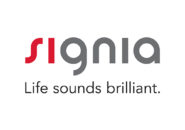Ok, you came for a hearing test and you have been diagnosed with a hearing loss and have decided to be fitted with a hearing aid.
At Hear in Colour we assist with hearing aid supply, the fitting & fine-tuning of your hearing aid and verification.

Congratulations, your life is about to change. But you might have a few questions such as:
Which hearing aid? Will it suit me? Will it be visible to others? How do I choose? Will I get used to it and will I benefit from it?
The good news is that Hear In Colour will be with you every step of the way. We will support you in this life-changing journey. All your concerns and questions will be well taken care of.
It is in our best interest to take care of each and every individual’s unique needs. We’ll make sure that you are fitted with the ideal hearing aid and accessories that would without a doubt change your life for the better.
We’ll provide you with various options for you to decide on. Once you have made an informed decision, we’ll go ahead and order the specific hearing aid. Approximately 2 weeks later we’ll contact you to arrange an appointment for the fitment. Thereafter we will then give it a week or two for a follow-up, just to check-in and see how you are coping with your new hearing aid. Should you wish, we can adjust the hearing aid to the desired level until you are satisfied. Yes, it is as easy as that. Our door is always open and we welcome you to be informed, to be empowered, to be you, a new YOU!
And to top it all, we offer four follow-up sessions within three months of initial fitment to ensure that you are completely satisfied. This enables us to meet the highest level of service that we strive to provide to all our patients.
Common Questions about Hearing Aids
If you think you might have hearing loss and could benefit from a hearing aid, visit your physician, who may refer you to an otolaryngologist or audiologist. An otolaryngologist is a physician who specializes in ear, nose, and throat disorders and will investigate the cause of the hearing loss. An audiologist is a hearing health professional who identifies and measures hearing loss and will perform a hearing test to assess the type and degree of loss.
Choosing a hearing aid is based on every individuals hearing loss as well as your personal preference regards to style, technology and financial means. Our audiologist will guide you through every step of the way.
Hearing aids are generally covered by medical aids in South Africa, although benefits differ depending on the benefit level you are prescribed to. The initial hearing test is usually covered by most medical aids with “day-to-day” benefits. Hearing aids are often covered from a separate “appliances” fund, whilst others use the benefit from the savings fund. We will help by contacting your medical aid whilst you are here.
Hearing aids are available in different technology levels – it is the technology inside the hearing aid that determines the price of the hearing aid. Your communication needs and lifestyle determines the technology level you need.
The features and technology includes these factors amongst others:
- Sound quality
- Reduction of background noise
- Preservation of speech in background noise
Certain hearing aid features have filtered down to the bottom price range which enables you to buy a good quality hearing aid even with a restricted budget.
Proper maintenance and care will extend the life of your hearing aid. Make it a habit to:
- Keep hearing aids away from heat and moisture.
- Clean hearing aids as instructed. Earwax and ear drainage can damage a hearing aid.
- Avoid using hairspray or other hair care products while wearing hearing aids.
- Turn off hearing aids when they are not in use.
- Replace dead batteries immediately.
- Keep replacement batteries and small aids away from children and pets.
Myths and Facts about hearing aids
MYTH: My hearing loss is not severe enough for a hearing aid.
FACT: Hearing loss often develops slowly. Because of this, you may not notice how bad your hearing has gotten. If loved ones are often commenting on how you cannot hear, then you should strongly consider having your hearing tested. An audiologist will be able to determine the extent of your hearing loss and what device is best suited for it.
MYTH: I only have difficulty hearing certain sounds. I can hear everything else just fine, so I don't need hearing aids.
FACT: Being unable to hear certain sounds is still hearing loss, and it can significantly impact your daily life and conversations with people. Hearing loss often becomes worse over time, so getting a hearing evaluation done by a professional early on will give you a clear indication of your hearing range capabilities.
MYTH: Worn over time, hearing aids will restore your hearing.
FACT: A hearing aid will not cure your hearing loss. When worn, they will improve your listening and communication abilities. All of which will greatly enhance your quality of life. It can also help to prevent further hearing loss, and auditory deprivation (helping you to understand speech better in the long run). This can also help to prevent early onset Dementia and Alzheimer’s.
MYTH: Money can be saved by purchasing your hearing aids online.
FACT: Consulting with an audiologist is the only way that you can guarantee access to a quality device properly programmed for your needs. An audiologist will also provide other services such as a hearing evaluation, hearing aid fitting and follow-up, repair maintenance, and rehabilitation.
MYTH: Only old people wear hearing aids.
FACT: Contrary to popular belief, hearing loss isn’t restricted to the older population. Only 35% of people who have hearing loss are over the age of 64, and more and more young people are in need of treatment because of prolonged exposure to loud music and noise. About six million people between the ages of 18 and 44 have hearing loss.
MYTH: Wearing hearing aids will make me stand out.
FACT: Feeling self-conscious is a normal feeling when something about your appearance changes, but you’ll be taking a step to be in control of your health, which you should be completely proud of! With the incredible advances in hearing aid technology today, there are a lot of options available that will work for your needs and comfort. There are even different colour options available; why not personalize your hearing aid devices with your favourite colour?
MYTH: Hearing aids make horrible screeching sounds!
FACT: They used to, and it was horribly annoying! But really, today’s devices are so much more advanced than they used to be, and feedback cancellation is a common feature now
MYTH: Hearing aids are too expensive.
FACT: As mentioned above, today’s hearing aids have better technology and more features than they used to. They are also electronic devices that are an investment in your health. The investment in a better quality of life is worth it.
MYTH: Only old people wear hearing aids.
FACT: Contrary to popular belief, hearing loss isn’t restricted to the older population. Only 35% of people who have hearing loss are over the age of 64, and more and more young people are in need of treatment because of prolonged exposure to loud music and noise. About six million people between the ages of 18 and 44 have hearing loss.
MYTH: Wearing hearing aids will make me stand out.
FACT: Feeling self-conscious is a normal feeling when something about your appearance changes, but you’ll be taking a step to be in control of your health, which you should be completely proud of! With the incredible advances in hearing aid technology today, there are a lot of options available that will work for your needs and comfort. There are even different colour options available; why not personalize your hearing aid devices with your favourite colour?
MYTH: Hearing aids make horrible screeching sounds!
FACT: They used to, and it was horribly annoying! But really, today’s devices are so much more advanced than they used to be, and feedback cancellation is a common feature now
MYTH: Hearing aids are too expensive.
FACT: As mentioned above, today’s hearing aids have better technology and more features than they used to. They are also electronic devices that are an investment in your health. The investment in a better quality of life is worth it.
MYTH: Hearing devices are only for people who have severe hearing loss.
FACT: No! Hearing aids help with all degrees and ranges of hearing loss. The key is to ensure that you see a professional who can identify what your hearing needs are and provide you with solutions. Plus, it’s been proven that treating even minor hearing loss can increase your quality of life!
MYTH: I can understand the general idea of conversations by watching people talk. I don't need hearing aids just yet.
FACT: Ignoring your hearing difficulties or working around them not only makes you feel less in control, but the people around you can feel increasingly frustrated and unable to help. The best thing you can do for your hearing care is to take control of it and get a hearing evaluation done by a professional. It will give you peace of mind and a good sense of what your hearing range really is so you can explore solutions. Treating hearing conditions also helps overall quality of life and improves relationships with other people. Ask yourself this question: what do I gain by doing nothing about my hearing difficulties versus taking control of them?
MYTH: My friend doesn't wear two hearing aids, so I don't need to either.
FACT: Everyone’s hearing difficulties are different and require individualized care, just like many other medical treatments. Have you ever tried on a friend’s prescription glasses out of curiosity or for fun? Did they correct your vision perfectly? What works for your friend may not work for you, especially when it comes to your health. Again, a hearing healthcare professional has undergone training to provide you with expertise and the best options for your treatment. The brain is designed to use information coming from both ears, so if you have difficulty hearing in both ears, wearing two hearing aids can significantly help with localizing sounds, hearing in noisy environments, and improving your overall hearing experience. Being able to fully reconnect with your friends and loved ones in conversations is worth it!
MYTH: My hearing will get worse becaue my ears will depend on the hearing aids.
FACT: Your hearing will not get worse by wearing a properly fitted hearing aid. Hearing aids provide your ears with sound otherwise not heard without hearing aids. Without a hearing aid, your ears do not receive sounds that they used to and your brain “forgets” what those sounds were like. It is important to stimulate your ears and brain with sound. You should depend on your hearing aid. Because you lost your hearing gradually, you probably did not notice a big difference from day to day. Once you get used to hearing well with a hearing aid, you will notice a bigger difference (not hearing as well) when you take it off.
The process and journey with hearing aids

Getting fitted
So you and your audiologist have made the decision and your hearing aids have been ordered. What to expect next?
You will be contacted for an appointment as soon as we have received your hearing aid (in some cases we might have the hearing aid the next day!). This appointment will be for about 45 -60 minutes.
Hearing aid styles
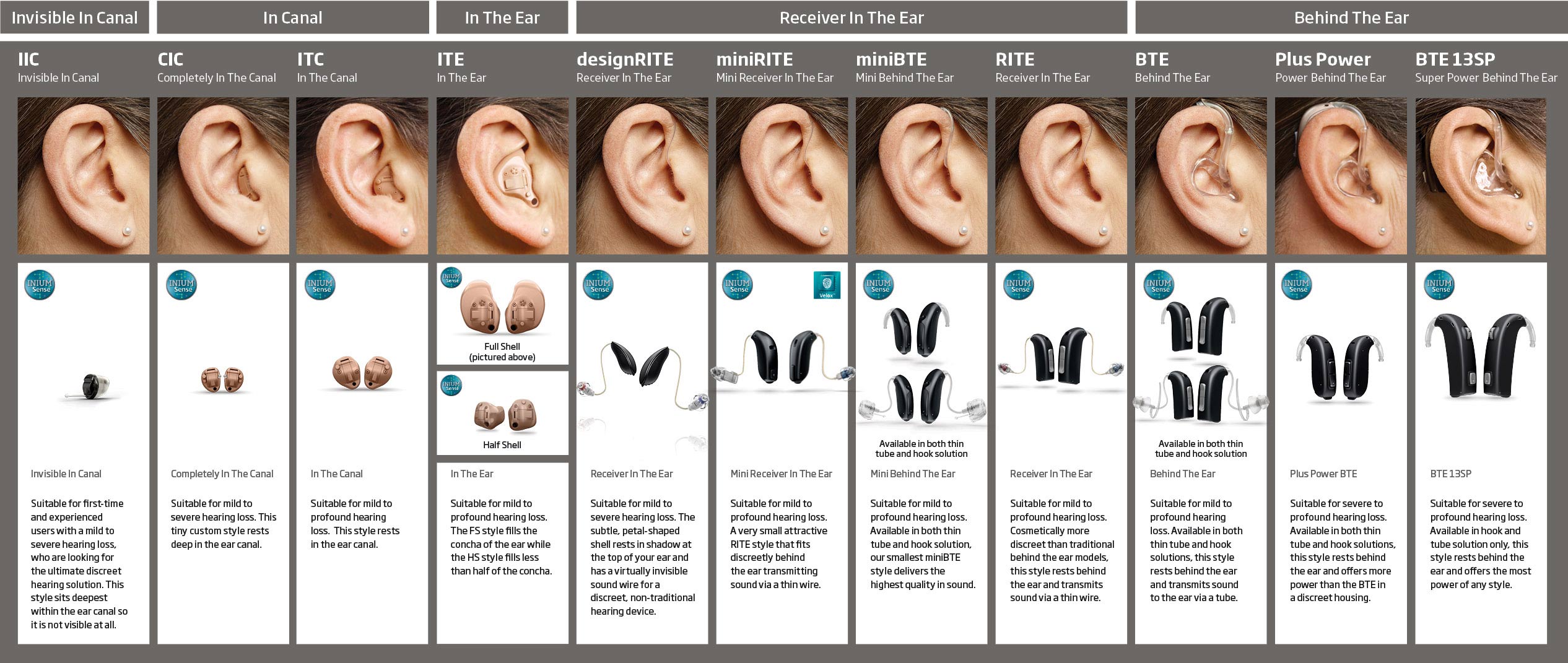
Hearing aid accessories
Hearing aid accessories are optional extras which enhance and enrich your hearing aid experience. Fantastic advances in technology have enabled companies to provide the hearing aid user accessories to use with their hearing aids in order to enrich the hearing experience in different situations.
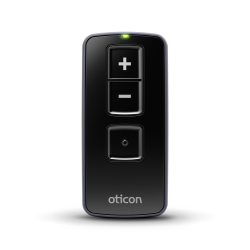
Remote Control
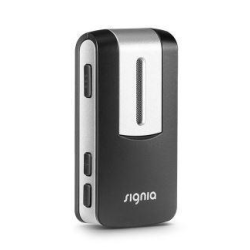
Remote Microphones
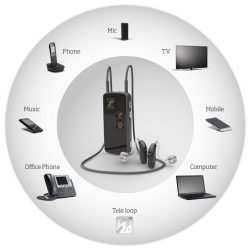
Bluetooth Devices
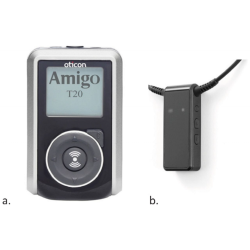
FM System

Charger
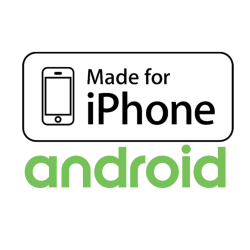
Applications on Smartphone & Tablets
Brands we maintain and supply
Your hearing aid has been fitted and you are on your way home…
Know what is in store.
Getting used to hearing instruments can take anywhere from just a few hours, a few days to a few months, depending on your hearing loss, the type of instrument you are wearing, and your ability to adapt. But you will be amazed at how much can be achieved in a short space of time if you are willing to try. It is important to understand that no matter how advanced your instruments are, they will never be able to completely restore your hearing.
What you can expect is to hear and understand much more in a wide variety of situations. You will perform better at work or when volunteering; socializing will become more enjoyable, you will feel more confident, and you might even get more energy to enjoy the good things in life. Your family and friends will certainly notice the difference!
Learning to hear again and life in colour!
Hearing instruments can make a very positive difference to your life. However, they are not like glasses, which restore your vision the moment you put them on. Initially, certain sounds might seem rather loud – even strange. This is because the brain forgets what it was like to be able to hear those sounds, and it has to learn how to process them again. You will hear voices and sounds that you may not have heard for a long time. First, your brain has to identify these sounds. Then it has to relearn to focus on the ones that are important and filter out the rest. As you regain the ability to master this task,
you will discover that the more you use your instruments, the less you will want to be without them! Train your brain because the brain registers so many new sounds, the initial adjustment period can be quite tiring.
It is a bit like training a muscle that has not been used for a long time. What a difference it makes when you regain that lost strength! After wearing your instruments for a couple of weeks, you may need an appointment with your Hearing Care Professional for adjustments. Once these have been made you will be able to practise much more and get the very best out of them on a daily basis
Your initial experiences & things that might surprise you.
Knowing what to expect is the first step to being happy with your instruments. The more severe your hearing loss is, the more likely you are to be overwhelmed by all the new sounds, and their apparent volume. But the more open and natural-sounding your instrument is – for example a RITE (Receiver-in the- Ear) style with an open connection to the ear – the easier you will find the adaptation process. Be prepared for new experiences: things might sound strange at first, but with time you will get used to your new way of hearing.
- My hearing aid feels uncomfortable. Some individuals may find a hearing aid to be slightly uncomfortable at first. Ask your audiologist how long you should wear your hearing aid while you are adjusting to it.
- My voice sounds too loud. The “plugged-up” sensation that causes a hearing aid user’s voice to sound louder inside the head is called the occlusion effect, and it is very common for new hearing aid users. Check with your audiologist to see if a correction is possible. Most individuals get used to this effect over time.
- I get feedback from my hearing aid. A whistling sound can be caused by a hearing aid that does not fit or work well or is clogged by earwax or fluid. See your audiologist for adjustments.
- I hear background noise. A hearing aid does not completely separate the sounds you want to hear from the ones you do not want to hear. Sometimes, however, the hearing aid may need to be adjusted. Talk with your audiologist.
- I hear a buzzing sound when I use my cell phone. Some people who wear hearing aids or have implanted hearing devices experience problems with the radio frequency interference caused by digital cell phones. Both hearing aids and cell phones are improving, however, so these problems are occurring less often. When you are being fitted for a new hearing aid, take your cell phone with you to see if it will work well with the aid.
- Start by wearing your instruments for most of the day.
- Use them in quiet situations, and in one-on-one conversations in your living room
- Listen to the radio or television.
- Use them in noisier environments such as a busy road and your local supermarket
- Use the telephone.
- Finally, use them with friends or family at home and at your favourite restaurant. This is likely to be the most challenging scenario. At first you may not be able to hear everything that people are saying, but with time this gets easier.
- Your alarm clock, doorbell or phone ringing might make you jump the first time you hear them
- Hearing yourself chewing will sound strange at first
- The crinkle of newspaper pages being turned will sound sharper
- Traffic noise will sound louder
- The echo of your own footsteps
- The sound of stringed instruments
- Rain against your window
- Flushing your toilet might sound like Niagara Falls
- Your refrigerator will hum more loudly
- Your car will sound different now that you can hear the engine clearly
- Birds singing
- Children laughing
- Rustling of leaves on trees








